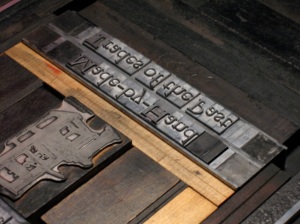Having worked primarily with PDF documents and all the minutiae of their fonts and such over the years, I've come to have a great appreciation for typography. This appreciation has led me down some interesting paths, most notably when I visited the Wilson Printing Office a few years ago, originally built in 1816 in what is now Old Deerfield Village (about a half hour's drive north). It's a quaint old building in a quaint old village, exactly what you'd expect in New England:
 Inside, you can find a very old, manually-operated, movable-type letterpress. It's entirely functional, and luckily, visitors are allowed to operate the behemoth.
Inside, you can find a very old, manually-operated, movable-type letterpress. It's entirely functional, and luckily, visitors are allowed to operate the behemoth.

 I was reminded of this recently when I stumbled across this video, where the proprietor of Firefly Press (located in Somerville, MA) talks about his love of letterpress, the state of his craft, and how he expects it to die eventually, simply because people will forget how to do it:
I was reminded of this recently when I stumbled across this video, where the proprietor of Firefly Press (located in Somerville, MA) talks about his love of letterpress, the state of his craft, and how he expects it to die eventually, simply because people will forget how to do it:
[youtube=http://www.youtube.com/v/Iv69kB_e9KY&hl=en&fs=1]
The artfulness, the care, and the precision of the work exhibited there is remarkable. Seeing it makes me want to retire and build a letterpress from scratch, and start pumping out lovingly-crafted stationary and such (although remember, self-sufficiency is the road to poverty).
As Sisyphean as it might seem, I try to bring as much of that spirit as I can to what I do. Despite the sometimes soul-sucking pop culture of software development, the drumbeat of get-it-done-fast that comes on every vector, and the never-ending treadmill of "new" technologies that parade across social news sites, I try to bring a craft to the code I write, the systems I build, and the experiences I assemble for my customers.
I'm heartened that it seems that I'm not alone in this. There are many like me that seem to have re-discovered what's important and relevant to building sustainable systems – and discovered that, yes, it's possible to keep that separate from the trendy, the immediate requirements, the moment's conveniences. Computation, after all, doesn't appear to change much. Lambdas and pointers are likely to be there, waiting for future generations just as they serve us today – modulo some (hopefully slight) packaging that helps with interacting with the broader world.
(It appears that this perspective may be necessary [though surely not sufficient!] in order to build successful, and not merely elegant systems that solve today's and tomorrow's pressing problems. No one will cheer much anymore when an application is delivered that is largely built while sitting on one hand [a Spolkyism there, I believe, referring to IDE wizards and such].)
Something said in that video really rung out to me, reminding me of the traditions of LISP that exist, and where I happen to stand in relation to them:
The old guys got it remarkably right.
Of course, the old vanguards have faded for the most part; many have turned to Clojure and other modern lisps. Thankfully though, that sense of craft and the original intent and spirit of "the old guys'" work is there and alive.
A quick search for 'letterpress' uncovers a host of shops, plying their craft, making beautiful things out of cloth and cotton and wood and steel. May that continue to be the case 100 years hence, too.